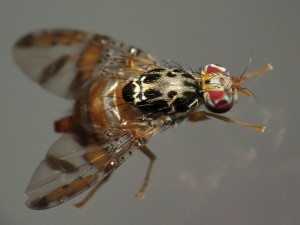The Mediterranean fruit fly, or medfly, is an invasive species that is now endemic to Western Australia. The female medfly “stings” fresh fruit and then lays her eggs in the puncture site. The hatching larvae then feast on the decomposing fruit. A British bioengineering firm called Oxitec has created genetically modified medflies that, when released into the environment, could mate with wild fruit flies and pass on a gene that would prevent their female offspring from reaching adulthood which would then prevent the species from reproducing and affecting more fruit crops.
In Western Australia, the Mediterranean fruit fly (Ceratitis capitata), also known as the Medfly, is a major problem for commercial orchards and householders. It feeds on more than 250 types of fruit, including citrus, apricots, nectarines, peaches, mangoes, apples and pears. The female medfly “stings” fruits as she lays her eggs, making them vulnerable to infection and rot. A decision last year by Australian regulators to phase out the organophosphate insecticide fenthion has prompted a search for alternative methods of controlling the fruit pest. Oxitec male flies are released to mate with wild female flies. When they do, they pass on a “self-limiting” gene which prevents female offspring from reaching adulthood. This prevents the females from stinging fruit crops, or reproducing, thus shrinking populations of the fly in the release area.
“We need to evaluate new tools that could become a helpful part of integrated pest management practices,” said Dr Neil Morrison, research lead for agricultural pest control at Oxitec. The principles used to create the GM medfly have already been trialled against dengue fever-carrying mosquitoes in the Cayman Islands, Panama and Brazil. Australia will carry out trials of a genetically modified insect to see if it can control a destructive crop pest. “We need to evaluate new tools that could become a helpful part of integrated pest management practices,” Neil Morrison, lead researcher for agricultural pest control at Oxitec, told the BBC.
Dr. Nikolai Windbichler, a researcher from Imperial College concurred that multiple tests should be conducted first before arriving at a final conclusion of whether or not Medfly damage can finally be eradicated through genetic modification.
For more information please visit: www.oxitec.com


Comments are closed.